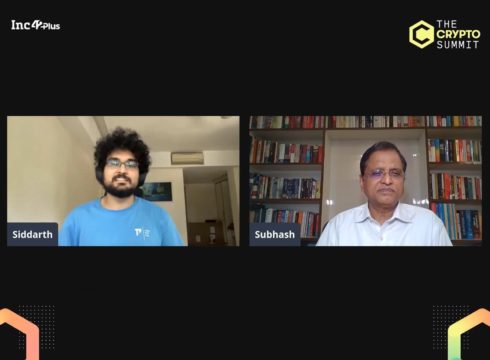SUMMARY
Different crypto assets might need different kind of exchanges or regulatory bodies and a lot is still to be understood clearly, says Subhash Chandra Garg, Former Finance Secretary
The nature of the crypto asset will determine how the regulations will be shaped in the upcoming crypto bill
The government needs to discuss 3 broad issues: currency aspect, how to deal with this Blockchain technology and laws around privacy and security of users' data, he emphasises
Inc42 Daily Brief
Stay Ahead With Daily News & Analysis on India’s Tech & Startup Economy
As demand grows for regulating cryptocurrencies in India, amid the wait over the clearance of the proposed Crypto bill, Subhash Chandra Garg, Former Finance Secretary, Government of India, has said we can only determine to regulate cryptocurrencies after deliberating over all the forms of crypto assets around, as we are not dealing with one single asset like a commodity or equity or just a Blockchain platform but a whole set of Blockchain-based assets.
Speaking at one of the sessions of India’s largest Crypto Summit organised by Inc42, Garg said that different crypto assets might need different kinds of exchanges or regulatory bodies.
“A lot is still to be understood clearly, but in principle, the nature of the crypto asset will determine how the regulations will be shaped,” Garg, who chaired the interdisciplinary panel on crypto in 2018, told Siddarth Pai, Founding Partner at 3one4Capital.
Garg stressed that while finalising the Cryptocurrency and Regulation of Official Digital Currency Bill, 2021, the government needs to deal with three broad issues.
“The first is how the government is going to regulate crypto from the currency aspect. The second aspect is how do you deal with Blockchain-based technology. Normally the government does not regulate technology as such, but this technology is producing real economy products which are heavily regulated and hence, the same regulatory mechanism needs to be created for crypto. Thirdly, we have data privacy concerns and the Information Technology Act, 2000 and the personal data protection law should be reconfigured to take this new world of blockchain into account”.
He emphasised that policymakers and regulators can treat cryptos as crypto assets, which may represent different crypto assets like crypto currencies, crypto securities or values of underlying or connected crypto-businesses, like application platforms, NFTs (non-fungible tokens), digital assets etc.
Garg made several key points around cryptocurrencies and how these can be regulated. Some of these are:
- Decentralised technology is changing the idea of a nation. It’s the foundation of “one world” and, therefore, ideas such as jurisdiction need to be reassessed as we progress, just like we have a global maritime law
- Cyberspace is distinct from physical space and we need global solutions to address fraud and crime within the ecosystem
- The way cryptocurrencies have evolved in value, the world may not accept their use as currency. This has led to the evolution of stable coins
- The government and central bank did not understand the blockchain and crypto technology completely in the early days but were ready to explore the ecosystem. Its presence in private currency, though, had to be prevented from creating economic disruption.
- Trust is the most important commodity when it comes to Crypto as a currency
- Most central banks have figured out how to keep the central currency stable and people trust that currency. There is a lot of discomfort over the dollar being the global currency but we still haven’t found the solution.
Note: We at Inc42 take our ethics very seriously. More information about it can be found here.


